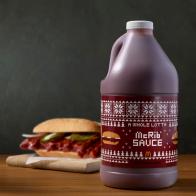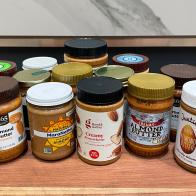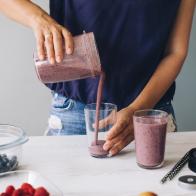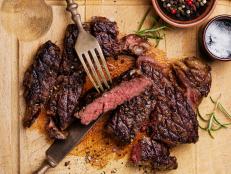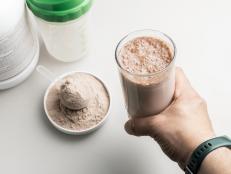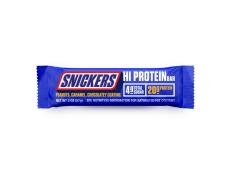David Protein Bars Are the Epitome of the “Biohacking” Trend
As a dietitian, I probably wouldn’t recommend stocking these $3 bars in your pantry, no matter how “groundbreaking” they claim to be.
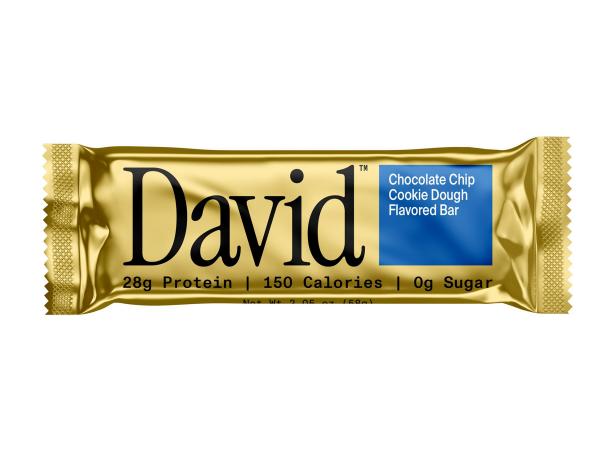
Photo courtesy of David
Although there’s no official definition for “biohacking,” most sources seem to agree that it’s an umbrella term used to describe various hacks that supposedly enhance your physical and mental health and performance. It’s never used to describe any of the basic health-supporting behaviors that have decades of evidence behind them (like eating a balanced diet, getting enough sleep or exercising regularly). Rather it’s only used to describe things that are far more specific, difficult and science-y sounding (although often with limited evidence behind them).
Bulletproof coffee will supposedly biohack your metabolism. Intermittent fasting is a biohack for weight loss. Fitness trackers and other wearables promise to make your biohacking efforts more convenient and precise.
And now, it seems you can biohack your protein consumption with David protein bars, a “groundbreaking” new offering that contains more protein and fewer calories than other bars on the market. Take a look at the brand’s recent press release or its website and you’ll see that there are four flavors — Cake Batter, Blueberry Pie, Chocolate Chip Cookie Dough and Double Fudge Brownies — and that it’s $39 for a 12-pack (compare that to these recommended protein bars, many of which are offered at about half the price). You’ll notice that David is affiliated with two of the biggest names in biohacking. Peter Attia, a physician and host of The Peter Attia Drive Podcast, serves as the brand’s chief science officer; Andrew Huberman of the Huberman Lab podcast is a key investor. You’ll also see lots of impressive-sounding language about protein ratios, PCAS scores and metabolic health.
But — does any of it really matter? Here’s everything you need to know about these bars, from the marketing claims to the nutrient content to the actual taste.
Yes, the bars are high in protein and low in calories.
At 28 grams of protein and 150 calories apiece, these bars definitely qualify as a high-protein snack. The website explains that they’re 75-percent CPF (which means that 75-percent of the calories in the bar come from protein), and that the protein has a perfect protein digestibility-corrected amino acid score (PDCAAS). That means it contains all of the essential amino acids that our bodies need from protein.
The extra grams of protein you’ll get in a David bar may not do much.
Now, this all sounds great. But it doesn’t really explain why this does or doesn’t matter when it comes to overall nutrition. The site talks about the importance of protein, but it doesn’t mention that carbohydrates and fat are also important for your overall health. And, it glosses over the fact that the jury is still out on how much protein your body can actually use for muscle synthesis at one time — the existing research suggests that it’s probably somewhere between 20 and 30 grams every 2-3 hours. That means some of the protein in these bars might not be put to use (especially in smaller people, since the amount of muscle mass you have plays a role in this).
PDCAAS score isn’t something most people need to think about.
The point about the PDCAAS score is also a little bit misleading. While it’s important to get all essential amino acids from food sources, you’re probably getting them all anyway from your regular diet — especially if you eat animal products. Research shows that milk, eggs, whey protein and chicken breast also have perfect PDCAAS scores, and most people who eat a variety of protein-containing foods (including plant foods like beans, tofu, nuts, seeds and grains) get all the essential amino acids they need. So, a food’s PDCAAS score doesn’t mean a whole lot for most of us. (And, other whey-based supplements also have perfect PDCAAS scores.)
As for the bar of being lower in calories than other options out there? That’s fine, but remember that it’s just one thing you’ll eat over an entire day. A lower-calorie snack bar might mean you’re a little bit hungrier at your next meal, and you end up eating more than you normally would. Plus, being lower in calories doesn’t necessarily make something better. Calories aren’t a bad thing — they’re how your body gets energy, and you need a certain number of them every day to stay healthy and feel good.
Just to throw this out there: These bars are an ultra-processed food.
For the record, I don’t think there’s anything wrong with including some ultra-processed foods in your diet. They’re convenient, often delicious, and you can meet your needs as long as you’re getting a variety of nutrients from lots of different types of food.
Do you know who usually demonizes ultra-processed foods? Biohackers. “Most of us … should be focused on ingesting non-processed and minimally processed food, maybe even cooking our own food,” Andrew Huberman (one of David’s investors) said on his podcast. And yes, nutrition is nuanced, and people contradict themselves all the time. But when the same group of people who push a minimally processed diet then turn around and try to sell you on a packaged protein bar, it should raise some red flags.
It’s also worth noting that the David bars are sweetened with allulose, a type of sugar substitute that’s low in calories and not absorbed by your body the same way that sugar is. While allulose is probably fine in small amounts and is “generally regarded as safe” by the U.S. Food and Drug Administration (FDA), it’s also known to cause symptoms like gas and bloating in some people, and it’s not yet approved for use in Canada or Europe because there hasn’t been enough testing done on it yet.
I tried all four flavors of these bars, and they’re fine.
Each David bar has a sticky, chewy consistency that’s similar to a Quest bar, plus crunchy little rice puffs (although they’re not made with rice) that add more texture. They’re all really sweet (from the allulose) with a slight bitter aftertaste that’s common in most protein bars. If I had to pick a favorite flavor, I’d probably go with the chocolate chip cookie dough, although all of the bars tasted pretty similar.
Bottom Line: David protein bars are fine, but they’re not magic. (Most biohacks aren’t.)
Biohacking appeals to people because it promises big results that only require small tweaks. And it usually involves super scientific language that makes it seem legitimate.
But a lot of the time, it’s all smoke and mirrors. There’s nothing wrong with David protein bars, but they’re certainly not the groundbreaking discovery they claim to be. They’re just another protein-rich packaged food that you can stock in your pantry, or not.
*This article was written and/or reviewed by an independent registered dietitian nutritionist.
Related Content:












